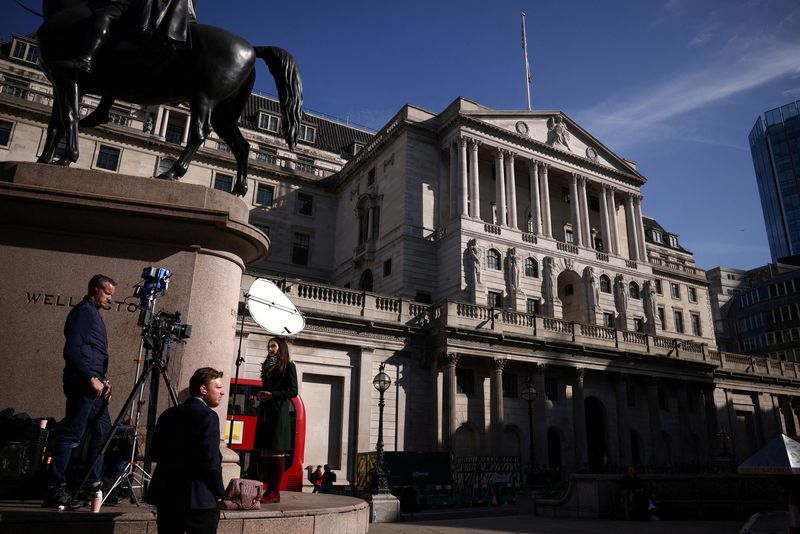By David Milliken
LONDON (Reuters) - The Bank of England looks set to raise interest rates by a quarter point to a 15-year high of 4.75% on June 22, its 13th straight rate rise as it fights unexpectedly sticky inflation that risks making it a global outlier.
Investors this week bet the Bank of England might hike rates as high as 6% this year - well above where the U.S. Federal Reserve or the European Central Bank are expected to go, and a level not seen in Britain since 2000.
BoE Governor Andrew Bailey told a parliament committee on Tuesday inflation was taking "a lot longer than expected" to come down and the labour market was "very tight".
Bailey was speaking just after official figures showed basic pay in the three months to April rose by an annual 7.2% - the fastest on record, excluding periods where the data was distorted by the COVID-19 pandemic.
While pay is still falling when adjusted for inflation, these numbers caused markets to ramp up their bets on BoE rate hikes, and pushed two-year government bond yields to their highest since 2008.
Three weeks earlier, there was a similar sharp move after data showed consumer price inflation fell less than forecast in April, leaving it at 8.7%, the joint-highest with Italy among large advanced economies.
"The UK is really experiencing a very challenging situation. It is obviously challenging for all the central banks, but I think the UK is uniquely challenged," said Katharine Neiss, chief European economist for investment firm PGIM Fixed Income and a former BoE official.
However, Neiss thinks the BoE is unlikely to raise interest rates as much as markets have priced in.
"The direction of travel is the right one - higher rates - but perhaps not as high as the market is expecting," she said.
In a Reuters poll this week, economists predicted the BoE would raise interest rates just twice more, taking rates to a peak of 5% by August or September.
If that proves the case, the BoE will not have much more tightening in store than markets currently expect for the Fed - whose policymakers see two more rate rises - or the ECB, which raised rates on Thursday and whose President Christine Lagarde indicated another rate rise was likely in July.
HOW MUCH TIGHTER?
The BoE faces three big challenges when assessing how much more rate tightening it needs to do.
First, the structure of Britain's mortgage market has changed since its last tightening cycle in 2006-2007. Fewer households have mortgages and more are on fixed rates - so a key channel for higher interest rates to affect the economy now operates with a delay.
While the most recent jump in interest rates has caused turmoil for homebuyers, the BoE estimates three quarters of the tightening is yet to be felt.
"The writing is on the wall in terms of the health of the UK consumer, who must be already existing on fumes given the ongoing negative real wage growth that we're seeing," said Richard McGuire, head of rates strategy at Rabobank.
Two of the nine members of the BoE's Monetary Policy Committee (MPC), Swati Dhingra and Silvana Tenreyro, have voted against rate rises since December.
Second, it is unclear how much of Britain's inflation premium over other countries represents a time-lag - partly due to a different timing of energy subsidies - rather than persistent inflation pressures.
However, the BoE is likely to have been alarmed by core CPI - which excludes energy and food - rising to 6.8% in April, its highest since 1992. May inflation data is due on June 21.
Third, the extent to which Brexit and any long-term impacts of COVID-19 on the labour market have hurt Britain's productive potential remains unknown.
"The central bank is effectively flying blind with regards to having a really strong view about where the supply capacity of the UK economy is," Neiss said.
Megan Greene - an economist who will succeed Tenreyro on the MPC next month - said on Tuesday she thought Britain's economy was probably incapable of growing faster than 1% a year without generating excess inflation.
In the short term, market interest rate expectations are now back at the level where they were in November, when the BoE indicated they were too high.
But Bailey's opportunity to fine-tune his message to markets will be limited next week, as no new economic forecast or accompanying press conference is scheduled.
And despite the unwelcome inflation surprise, markets see only a slim 15% chance of a half-point rate rise.

"If the Bank of England accelerated policy tightening now, that would smack of panic or a loss of control," McGuire said.
(This story has been refiled to change Katharine Neiss's affiliation to PGIM Fixed Income from PGIM in paragraph 7)